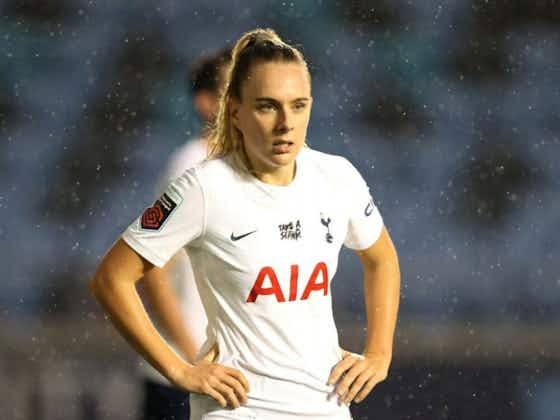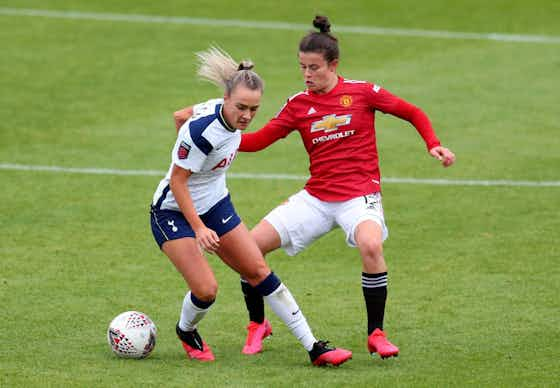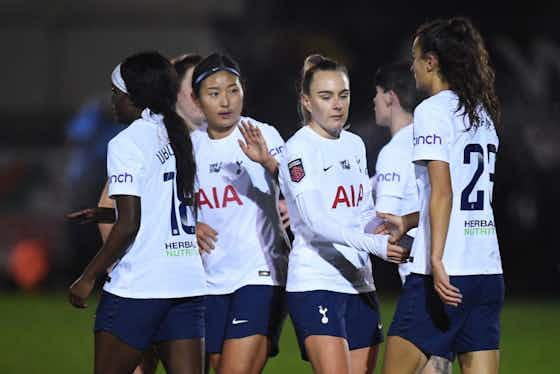OneFootball
Phil Costa·10 December 2021
Exclusive! Tottenham's Josie Green: 'I didn't turn professional until 25'

OneFootball
Phil Costa·10 December 2021

“I just remember thinking to myself ‘why can’t we have that?’ says Josie Green. “I didn’t understand it at all.
“You’re not really conscious about it because you’re just a kid. But growing up I didn’t have any female footballing idols, we didn’t even have a girl’s team at school and I always had to play with the boys.
“Of course I had heroes, I remember loving David Beckham and Teddy Sheringham but there was nobody for me to look up to or picture myself becoming.
“That’s why exposure is so important now because we can help young girls follow their path into football. A lot of us who are in the game now didn’t have that opportunity.”
Exposure is a pertinent word, with UK viewing figures for women’s football increasing by 297% in 2021, while across Europe those figures could even reach a 360% increase.
Greater access ignites greater interest and, unlike Green, who was limited in her sources of inspiration, girls can now watch their favourite players on a weekly basis and realise that professional football is achievable for them.
“I didn’t have that opportunity, so it’s something I’d love to give girls who love football but maybe don’t have an obvious route into the game.”
The Tottenham and Wales midfielder’s own route started in Greater London after contracting the football bug at home.
“I think like with most people, it starts with your family – mostly my dad and my brother. We were quite lucky to have a big garden and two neighbours who were both boys.
“I used to be out there all the time practicing kick ups, headers and volleys, you know the classic games when you’re a kid.
“My brother supported Tottenham but my dad supported more local teams like Watford and Luton, so we would go to games all over the area.
“And then whoever they were going to watch I’d ask ‘Can I come?’ so I was a tag along for everything.”
When it comes to her own path as a player, the heights of Women’s Super League football didn’t arrive overnight.
Green balanced semi-professional football with full-time teaching commitments for several years, and didn’t turn fully professional until her third year at Tottenham.
“I didn’t turn professional until I was 25 and a lot of my friends used to ask me ‘Why do you still play?’ because I was giving up all my weeknights and weekends.
“It’s simple really: because I love the game, I love the family feel that it brings. But I never thought I’d be in this position.
“It was difficult before because I was teaching during the week and then playing at the weekend, I really didn’t have much spare time.
“But when you’re passionate about something you don’t mind.”
The 28-year-old is keen to stress how difficult committing to professional football can be for women, who lack security and financial stability even at the highest level.
“It wasn’t an easy decision at all. I had just bought my first house and that’s a big thing to weigh up against the insecurity of being a professional footballer, especially compared to the men’s game, which offers far more financial stability.
“So I thought to myself, if I do this for a year and it doesn’t work out, what position will that leave me in for my mortgage? I was quite fortunate at the time to have completed my training to become a teacher.
“As female footballers, we really have a lot to consider.”

Green’s initial route into the game began at St Albans Girls FC, before she juggled her time between Sunday league outfit Bedwell Rangers and Watford during her teenage years.
Spurs came calling in 2016 but, unlike their male counterparts, the women’s team sat in the third tier. The move would force Green to drop down a level, a decision which she now looks back on with pleasure.
“My overall experience at Tottenham has been amazing. I fell back in love with football after joining the club and for that I’m forever grateful.
“I’ve made some amazing memories; two promotions, I scored at White Hart Lane, which was insane, we played West Ham at the London Stadium and I walked the team out as captain – we won that game 2-0.
“I’ll have these memories forever, so I’m grateful for that.”
And after finishing eighth last term, Spurs currently sit fourth in the table after eight games under the direction of Rehanne Skinner, who replaced long-serving duo Karen Hills and Juan Amoros last year.
“Our improvement is probably down to a bit of everything. Rehanne has great coaching experience in some top teams, we’ve got a great group of girls here at Spurs, everybody is so hard working and we really push each other.
“It’s a group that always strives to be better which is crucial. A combination of all those things has driven our great start to the season.
“With any team, if you make too many changes you’ll struggle to gel. But we’ve been in the WSL long enough now to have established ourselves and I think we’ve shown that this season.”

Green was also named club captain for a short spell following the departure of Jenna Schillaci in the summer of 2020.
Shelina Zardosky has since taken on the role but the midfielder insists she took plenty from her experience wearing the armband; both on and off the pitch.
“I think I was just myself, to be honest. I didn’t feel like I had to change anything or be someone I’m not.
“I think I just had a lot of natural skills that transferred over from previous experiences and what I’ve been through as a person.
“The club obviously saw something in me – especially from our first season in the WSL – and having the captaincy also made me grow as a person as well.”
The midfielder also boasts something not many footballers can – her status as an international player.
Green has been around the Wales set-up for a decade, making her senior debut aged 16 before returning five years later after a long break to spend time with her family.
“My link to Wales actually comes through my grandad. He lived in England but he was born in Pontypool which is just outside of Cardiff. I’m so proud to represent Wales and it’s such an honour every time you pull on the shirt.
“I don’t think you can truly know the feeling of representing your country until you’ve put on the shirt, walked out and sung your national anthem – it’s truly unique in terms of footballing experiences.
“I love it when I’m here, all the girls are great and more importantly there’s a great balance between working hard and enjoying yourself when you’re here.”
While some players have used their position to venture into cryptocurrency or fashion, Green reveals she is working on plans to create her own football academy tailored towards girls in the local area.
“At first I was just focused on my football and looking to establish myself as a professional. Now I feel more secure in my position, I’m looking into starting up a female football academy.
“That’s a work in progress at the moment and something I’m really excited about, so hopefully that can get off the ground because I’ve always wanted to be involved in something like this.
“I didn’t have that opportunity growing up, so it’s something I’d love to give girls growing up in my local area, who love football but maybe don’t have an obvious route into the game.”
Opportunity and exposure were two words commonly referenced by Green throughout our chat and, with higher attendances, new television deals, and more players turning professional every season, it’s clear women’s football is heading in the right direction.
Her journey almost matches that of the women’s game, having experienced football as an amateur, semi-professional and now professional playing at the highest level in England.
Long may the rise continue.






























































